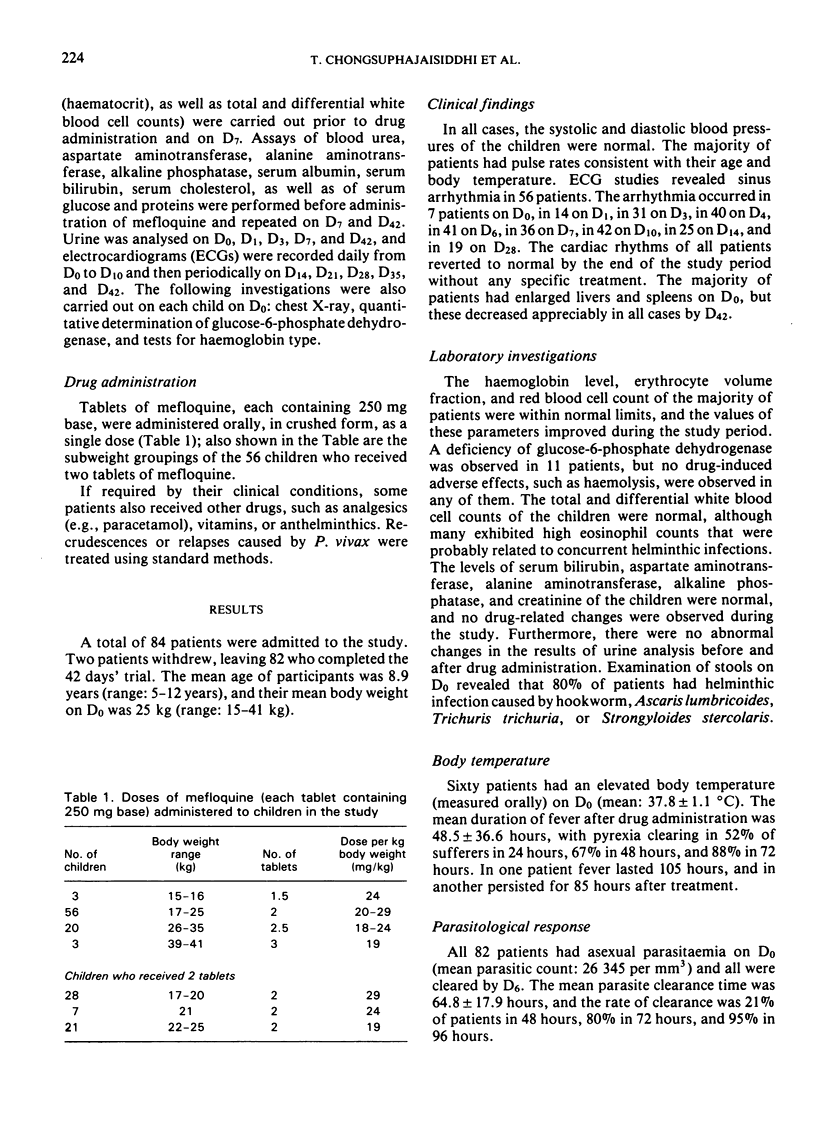Abstract
Mefloquine is a highly effective drug for the treatment of falciparum malaria among adults, but studies of its effects on children are lacking. An open, noncomparative trial of mefloquine was therefore carried out among 84 children aged 5-12 years who were patients at the Hospital for Tropical Diseases, Mahidol University, Bangkok, Thailand. The drug was administered as a single dose of 18-29 mg base per kg body weight. Eighty-two of the 84 children completed a 42-day period of post-treatment observation. The drug was well tolerated also by 11 children with glucose-6-phosphate dehydrogenase deficiency, and all the children in the study cleared their parasitaemia initially (average clearance time, 65 hours). Furthermore, the clinical-chemical parameters measured exhibited no drug-related changes during the study. The radical cure rate of nearly 98% and high tolerance indicate that mefloquine can be used effectively and safely for the treatment of children aged 5-12 years who are suffering from uncomplicated falciparum malaria.
Full text
PDF



Selected References
These references are in PubMed. This may not be the complete list of references from this article.
- Chongsuphajaisiddhi T., Sabchareon A., Attanath P. Treatment of quinine resistant falciparum malaria in Thai children. Southeast Asian J Trop Med Public Health. 1983 Sep;14(3):357–362. [PubMed] [Google Scholar]
- Chongsuphajaisiddhi T., Sabchareon A. Sulfadoxine-pyrimethamine resistant falciparum malaria in Thai children. Southeast Asian J Trop Med Public Health. 1981 Sep;12(3):418–421. [PubMed] [Google Scholar]
- Harinasuta T., Bunnag D., Lasserre R., Leimer R., Vinijanont S. Trials of mefloquine in vivax and of mefloquine plus 'fansidar' in falciparum malaria. Lancet. 1985 Apr 20;1(8434):885–888. doi: 10.1016/s0140-6736(85)91670-8. [DOI] [PubMed] [Google Scholar]
- Harinasuta T., Bunnag D., Wernsdorfer W. H. A phase II clinical trial of mefloquine in patients with chloroquine-resistant falciparum malaria in Thailand. Bull World Health Organ. 1983;61(2):299–305. [PMC free article] [PubMed] [Google Scholar]
- Kofi Ekue J. M., Ulrich A. M., Rwabwogo-Atenyi J., Sheth U. K. A double-blind comparative clinical trial of mefloquine and chloroquine in symptomatic falciparum malaria. Bull World Health Organ. 1983;61(4):713–718. [PMC free article] [PubMed] [Google Scholar]
- Rozman R. S., Canfield C. J. New experimental antimalarial drugs. Adv Pharmacol Chemother. 1979;16:1–43. doi: 10.1016/s1054-3589(08)60241-0. [DOI] [PubMed] [Google Scholar]
- Trenholme C. M., Williams R. L., Desjardins R. E., Frischer H., Carson P. E., Rieckmann K. H., Canfield C. J. Mefloquine (WR 142,490) in the treatment of human malaria. Science. 1975 Nov 21;190(4216):792–794. doi: 10.1126/science.1105787. [DOI] [PubMed] [Google Scholar]



